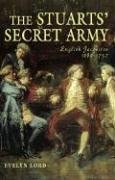Search -
The Stuart Secret Army : The Hidden History of the English Jacobites
The Stuart Secret Army The Hidden History of the English Jacobites
Author:
Author:
- Larger than life characters, useful for local reviews, e.g. Sir John Hynde Cotton (Cambridgeshire), John Byrom (Manchester), Colonel Foster (Northumberland)
- New view of the national conflict that ended at Culloden: strong for national reviews
- Spies, smugglers and poachers – sensationalism
- Treason and the Tory... more »
- A country divided is the major theme of many current TV History programmes
- Riots and rebellions, Jacobites in the streets, 1715 and 1745
- English Jacobites hugely important feature of 18th Century History but unexplored topic
- Bonnie Prince Charles romanticism continuously popular and reminiscent of Braveheart
- The guide to the local sites will build up that interest.
ISBN-13: 9780582772564
ISBN-10: 0582772567
Publication Date: 8/16/2004
Pages: 328
Rating: ?
ISBN-10: 0582772567
Publication Date: 8/16/2004
Pages: 328
Rating: ?
0 stars, based on 0 rating
Genres:




